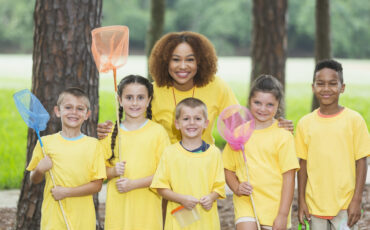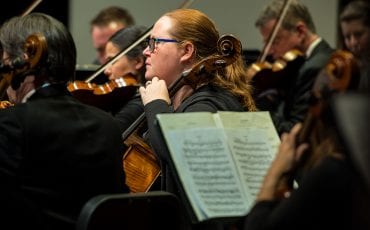Transitioning to School

Table of Contents
Help Your Child Make the Transition to PreK and Kindergarten
by Sherry V. Crawley
Take a moment to reflect on how you felt the last time you started a new job or moved to a new home. You probably didn’t sleep well for several days. You might have had too much nervous energy, and you were likely afraid you wouldn’t make new friends.
For kids entering pre-kindergarten and kindergarten, they are going from being at home with a caregiver or in a nurturing day care into a school setting and beginning a more structured and academic daily routine. That’s an awful lot to adjust to all at once.
If your child is nearing the transition into PreK or kindergarten, some thoughtful preparations for the big move can put your child on a path for academic and social success.
Plan Ahead
“Children develop so quickly, and anything that we can do as educators to assist young children and their families in this developmental process is a gift,” says Julia Stoll, a registered play therapist and a licensed professional counselor who has worked as a PreK counselor for 11 years, now at The Walker School in Marietta and Roswell Presbyterian Preschool.
Stoll suggests some hands-on activities to help families get ready for transition. “Have your child draw pictures and/or write letters to his current teachers to say thanks for the wonderful year and then write to the new teachers and school staff about how excited he is to come to the new school. This exercise provides the child an opportunity for closure while also opening up opportunities for discussion about the up-coming changes.”
“Make a hopes and dreams list,” Stoll says. “Ask your child what are his favorite things about the current school, then make a list of what he hopes to find at the new school. Talk about what you know to be true about the new school and then explain that you can work together to find out if the other things are true as well.”
Routine, Routine, Routine
Knowing what to expect can help children be prepared. “Creating structure in routine in your home life can help ease children into the expected structure of the classroom,” Stoll says. Make a list of simple chores like setting the dinner table or getting out their own pajamas that your child is expected to do each day, and encourage them to do these things more independently over time. Create a fun chore chart with stickers or magnets to give a tactile reminder of what’s left to do, and reward early successes with hugs and high-fives.
Jimmy Peeples, a kindergarten teacher at Alcova Elementary School in Gwinnett County, says that being deliberate about learning simple processes can make a huge difference. “Kids don’t understand what a line is, so learning to stand quietly in a row can be hard. And if you think about it, there are multiple steps involved in that fundamental skill.” Peeples suggests talking about and practicing the actions necessary to eat a meal at home: Preparing your plate, eating with utensils and cleaning up afterwards. These discussions can help children see how an action can be broken down into pieces, and then accomplished with confidence.
And on the flip side, letting go of existing habits can be tough; kindergarten classrooms have eliminated naptime, and although PreK children often have rest time, the business of the day can lead to sporadic and short napping. “I don’t think parents always realize there is so much rigor coming at children,” says Peeples, who also serves as an instructor in a summer camp at his school that is designed help kids adjust to kindergarten. “Kids can be mentally exhausted. Get a bedtime routine down, and that ‘lights out’ time is likely earlier than you think it needs to be, especially at the beginning of the year.”

Letting Go
Along with getting lots of rest, encouraging a sense of self-reliance is another important role for parents of children who are going through transition. During PreK, Stoll says, “academics are introduced in a more structured way and students are beginning to be held accountable for these academic experiences. It is the goal in the kindergarten year to assist students in developing an ability to learn and problem-
solve independently.”
“Allow your children to do for themselves as much as possible,” Stoll says. “Something as small as making your child carry his or her own book bag is a big thing for this age group. If they can open doors for themselves, don’t rush in to do this for them. This sends your children the message you believe in their ability to take care of themselves.”
Transitions are hard on the entire family, not just the young learner. Watching children grow is tough on parents, too. Peeples has some tough-love advice for parents: Fight the urge to linger or appear during the day at school. “Separation from home to school can be hard. But usually when the child is left at the school, within five minutes they are fine. But if you continue coming back, it is confusing to a child.”
You Can Do It!
Unclasping the tiny hand of a child walking into a PreK or kindergarten classroom is an exciting and scary milestone. Yet consider how proud you will be when your child comes home singing new songs, sharing new knowledge, and glowing with pride over new skills gained. Don’t wait until the last minute to begin preparing for these transitions – emotionally or academically – and work with your child to enter this new phase of life together.

Transition Tips from the Pros
Read to your child every day. Let them choose books at the library. Talk about what you read. Point out “environmental print” – signs, words on packages, etc. This verbal interaction and visual exposure to print will help kids learn skills they are expected to grasp quickly, like reading from left to right and identifying letters and sounds.
Take a tour of the new school with your child. Talk about the new environment afterwards, emphasizing the positive aspects of a fun new playground, a lunchroom filled with good smells, and a classroom with exciting new books.
Start doing some short structured activity in the evening. Activities such as letter flashcards or rhyming games will prepare your child for homework.
Set the school routine and stick to it. For example, deny the urge to drive your child to school the first week if he or she is going to ride the bus the rest of the year.
Avoid the over-scheduled trap. Refrain from signing up for extra-curricular activities during periods of transition to allow your child time to adjust.
Do you have another favorite that helped your child be prepared for PreK or kindergarten? Share it with us on our Facebook page: facebook.com/AtlantaParentMagazine







